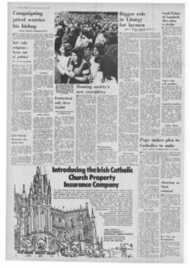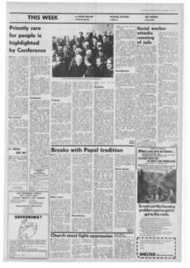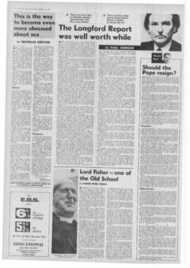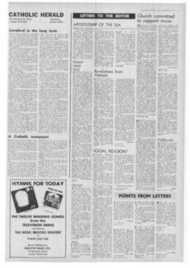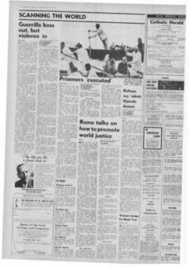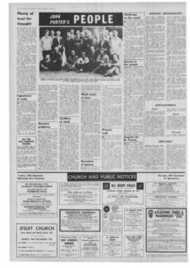Page 4, 22nd September 1972
Page 4
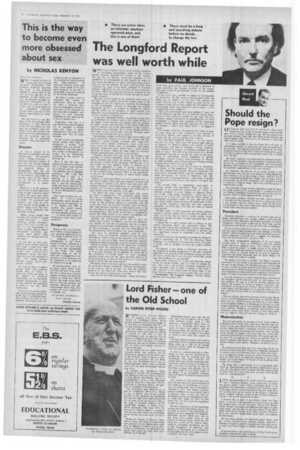
Report an error
Noticed an error on this page?If you've noticed an error in this article please click here to report it.
Tags
Share
Related articles
Angles On
Ss. Thomas More And John Ash Er Triduuni At Liverpool To...
Westminster Archives Giant Task Faces 'big Dig' Man A Small
A Martyr In The Toolshed
They Join To House The Lonely
Lord Fisher one of the Old School
by CANON PETER MOORE
READERS of the CATHOLIC HERALD will already have seen obituary notices of Archbishop Fisher, whose earthly existence ended on Septemblr 16. It had been a remarkably full life, and he had remained active until the end.
He died within a week of the fortieth anniversary of his consecration as Bishop of Chester in 1932. But in spite of achievements. such as securing for the Church of England an up-to-date code of Canon Law (after 300 years of increasing irrelevance), the age of Geoffrey Fiseher, like so many good things, already belongs to the past.
It was surely this fact, rather than any personal defect, that accounts for the cloud which passed across the latter years of his Primacy, when he failed to communicate—in particular with the Press. In the late Archbishop there was an authoritarianism which, while acceptable until 1939, has been increasingly rejected ever since.
In another way Archbishop Fisher belonged to the past. His contemporaries and colleagues were men such as Temple, Garbett, Barnes and Hinsley; and as an ex-headmaster raised to the Episcopal Bench he stood in a long (and now extinct) line of Anglican divines, all qualified by a brilliant Oxbridge career.
The Archbishop also belonged to an age of "certainties." Most of us belong to one of doubts. One of the striking features of his spiritual and intellectual life was this calm faith, unperturbed even by the event of the war (he daily slept in the cellar at Lambeth Palace) and the catachysmic changes in social mores which distinguish 1960 from 1930. Yet this was no negative thing — it could be said that you knew where the Archbishop stood, He left you in no doubt of that at all.
Within the Church of England, Archbishop Fisher will long be remembered with gratitude for his adminstrative abilities. As Bishop of London, and as Archbishop of Canterbury, he succeeded two people who could not have been more different from himself. Winnington-Ingram gave him the advice "Just carry on and alt will be well," while Temple's sudden death in 1944 removed a charismatic figure from the Chair of St. Augustine upon whom the hopes of many were pinned. Into the diocese, and then into the Church at large, Archbishop Fisher brought a new order, or rather a new sense and respect for order.
Cardinal Heenan recently attributed to Archbishop Fisher the drive towards unity being taken up so fully by the Roman Catholic Church today. It brought him both joy and sorrow.
It was in a sermon preached at Cambridge in 1946 that the Archbishop expressed his wish for growing into full communion with other Churches, and invited those not already possessing episcopacy to consider taking it into their systems. The time was not ripe, he felt, for Churches to merge their identity; but on the other hand he was vitally aware of the danger of an ecumenical stalemate upon the highest theological and doctrinal grounds.
The response of this sermon gave him great joy and one of its results wasthefirst visit made by an Archbishop of Canterbury to a Pope since that of Archbishop Arundel in 1397. This historic occasion would be difficult to overestimate; and it is salutary, when we are told that the ecumenical movement is dragging its feet, to recall how much we have to give thanks for, and how much has happened in only ten years.
But the consequences of the Cambridge sermon also gave Archbishop sorrow, for he made no secret of his implacable opposition to those proposals for AnglicanMethodist reunion which have now in fact been twice turned down by the Church of England, Such opposition was based on a quest not for organic unity, which he considered premature, but for mutual recognition of ministries and therefore, of Sacrament. It is a tribute to his foresight that this now appears to be, in practice, the way ahead.
blog comments powered by Disqus



